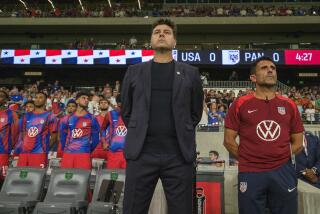Panama Action a ‘Catch-22’ for Latin Relations
WASHINGTON — “The effect of the Panama operation has been stunning,” a senior U.S. diplomat said Friday. “Panama has been as shocking a development for Latin America as the revolutions in Czechoslovakia, East Germany and Romania have been for Europe.”
Two weeks after the invasion of Panama, U.S. and Latin American diplomats are just beginning to sort out the long-term effects. And their initial assessment is that the military operation has dealt a serious blow to U.S.-Latin relations, despite the early optimism of some American officials.
“People are stunned that we actually did it,” explained the harried diplomat, caught between calls to Latin American officials to try to sell the U.S. position. “They thought this kind of intervention belonged to the old days.”
Beyond the diplomatic fallout, the invasion has created long-term headaches for the United States as it assumes the neo-colonial burden of rebuilding Panama, officials said. The Bush Administration is finding itself in a Catch-22 squeeze between its desire to bring troops home early, yet to remain in Panama long enough to remake the country’s military and police force.
Ironically, officials and analysts believe that there may soon be serious tension between the Administration and the civilian Panamanian government that it installed in power--because the only way President Guillermo Endara can establish legitimacy as a national leader, one official says, “is to bite the hand that feeds him.”
But the most immediate problem, officials said, is reassuring other Latin American countries that the Panama operation is not the first of a new wave of U.S. military adventures in the Caribbean, reminiscent of the first half of the century when presidents sent troops into Mexico, Nicaragua, Haiti and other countries to enforce Washington’s will.
Despite the overwhelming popularity of the invasion in the United States and Panama--where a poll released Friday found a whopping 92% approval for the presence of U.S. troops--most Latin American governments remain upset.
The invasion was “condemnable . . . a new and disgraceful humiliation for our peoples,” complained Venezuela’s President Carlos Andres Perez, one of South America’s senior statesmen and a frequent diplomatic ally of the United States.
The problem, Latin officials said, is that President Bush is asserting a right that they do not want to accept: to send U.S. troops south of the border if American citizens are in danger or when it seems to be the only way to oust a noxious dictator.
No Tears for Noriega
The outcry has been tempered by the fact that Manuel A. Noriega, the Panama strongman, had become a public embarrassment to the rest of the hemisphere; no Latin government is shedding tears over Noriega’s fall. Perez, for example, called the general’s regime “shameful” and said that other Latin American countries shared some blame for failing to force him out of office by peaceful means.
Still, a senior Latin American diplomat complained to U.S. officials this week: “Good causes don’t justify breaking good principles.”
The principle the Latin countries want restored is nonintervention--because many see it as the main diplomatic weapon against U.S. interference in their internal affairs.
President Bush acknowledged the problem--and the Latin Americans’ concerns--during a White House news conference Friday. “To some degree I am concerned, because I am well aware of how our friends south of our border . . . look at the use of American force anywhere,” Bush said. “Given the history of the use of U.S. force, I would be remiss if I didn’t face up to the problem that we must go forward diplomatically now to explain . . . that we acted, in our view, well within our rights.”
“I view this as very, very important diplomacy, and I am determined not to neglect the democracies in this hemisphere,” Bush added, saying that he is sending Vice President Dan Quayle to the area later this month.
Other officials said that the Administration is trying to reassure Latin governments that the invasion of Panama is not a harbinger of more such operations. “Is Panama a precedent for Nicaragua? No,” one senior official said. “Panama was unique.”
He said that the invasion has had “a Grenada effect”--meaning that it has impressed foreigners with the Administration’s readiness to use military power, as did President Ronald Reagan’s 1983 invasion of the Caribbean island of Grenada.
“Some of that is good, and some is bad,” the official added. “The good part is that the United States is no longer the laughingstock of the hemisphere; we have shown that we can’t be pushed around. The bad part is that we no longer have the resources to run the world, so we’re going to have to concert our efforts with other countries--and this makes that effort more difficult.”
Rebuilding the PDF
Moreover, he said, “Our longer-term problems in Panama haven’t really been defined yet. There is going to be trouble down the road. The economy is very fragile. . . . We aren’t sure yet how far to go in rebuilding the PDF (Panama Defense Forces).
“There is tension between the speed of the American withdrawal and what you do with the PDF,” he continued. “If you rebuild the institution completely and reorient it toward a police function, that increases the load on the United States. The question is, how much does one rebuild?”
Bush said that he plans to withdraw the troops he dispatched to Panama last month “as soon as possible.” But other officials, and analysts outside the government, said that a continuing U.S. military presence to remake the corrupt PDF may be the key to the survival of democracy in Panama.
The Administration may be able to withdraw most or all of the 14,000 combat troops who streamed into Panama before Christmas. But it also may have to send in other forces to train and assist the PDF in both military and police skills, they said.
“At this point, the United States is responsible for virtually all government services in Panama and for creating the democracy that we said we were going to restore,” said Robert Kurz, a Central America expert at Washington’s Brookings Institution. “If you act too quickly and take short cuts, you’re going to undermine the goals you’re after. . . . If you’re in too much of a hurry, you’re going to blow it.”
“You have to break the back of the PDF,” he added. “The PDF was not just Noriega. It was an octopus with tentacles in all parts of the government and the business world. It owned hotels, duty-free shops and a bank. If you don’t dismantle that apparatus of corruption, you end up where you started.”
Until now, however, U.S. military authorities in Panama have mapped out no clear course for reforming the PDF. Instead, in the interest of reconstituting a Panamanian police force as soon as possible, they have allowed most PDF officers to keep their jobs as long as they swear loyalty to the new Endara government.
Moreover, noted Richard Millett, a professor at Southern Illinois University, “American tutelage is going to be a very bitter pill for the Panamanian military to swallow.”
At least since 1968, when charismatic Gen. Omar Torrijos seized power, Panama’s military has defined its mission at least partly in terms of asserting Panamanian sovereignty over the U.S. troops who have been present in the country since the building of the Panama Canal.
“Endara is not going to get much recognition from other Latin countries until the (additional) U.S. troops are out,” Millett said. “And he isn’t going to get much legitimacy at home if he doesn’t at least jab the United States in the ribs once in a while.
“Congress is going to be asked to provide him with plenty of economic aid, but we shouldn’t expect too much gratitude over the long term,” he added.
More to Read
Sign up for Essential California
The most important California stories and recommendations in your inbox every morning.
You may occasionally receive promotional content from the Los Angeles Times.











